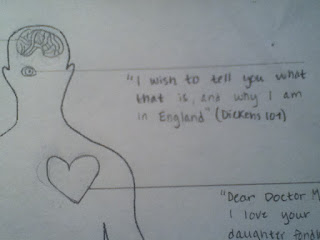Family. What does it mean to you? If you ask me, I would say they
are the group of people that love you the most and care about you so much that
they never leave your side. The function of family is to be there when nobody
else is. They are the people that know you so well that they will love you no
matter what. A family is a circle of strength, love, and compassion. Your
family is not limited to your parents and siblings, but extends far further
than that. So many families have step-parents, half-siblings, adopted siblings,
and much more, but they don’t love each other any less than the next family.
This just goes to show how family doesn’t have to be limited to your blood
relatives. It doesn’t have to be limited to the people you share DNA with, or
even the people you share a home with. It just has to be the people that you
love and that love you. Now, this may be the polar opposite of your definition,
which is okay, but think we can all agree on one thing- family has importance.
There’s a reason they stick together and that reason is love. There are two
pieces of literature that really speak to me about family; Stone Soup by Barbara Kingsolver and A Tree Grows in Brooklyn by Betty Smith.
In the essay
Stone Soup, Kingsolver says, “Arguing
about whether nontraditional families deserve pity or tolerance is a little
like the medieval debate about left-handedness as a mark of the devil. Divorce,
remarriage, single parenthood, gay parents and blended families simply are.
They’re facts of our time” (Kingsolver 16). I agree with her view because these
are things that aren't an opinion or a choice. They are bound to happen. There
is no preventing it and there is no hiding it- these things happen. They should
be tolerated for said reason. Whether a family is a "good" one or not is not determined upon who is in it, or what "type" of family it is. It depends on love. A family can be "broken" from society's perpective, but with love can be more wholesome than your so-called "ordinary" family. Kingsolver also writes, “If there is a normal for
humans, at all, I expect it looks like two or three Families of Dolls,
connected variously by kinship and passion, shuffled like cards and strewn over
several shoeboxes” (Kingsolver 24). Here, she references her paper doll family she
used to play with when she was young. What she’s saying speaks to me. She
perfectly explains the reason why a “normal” family doesn't exist. The idea
that we all have in our heads of this cookie-cutter family of 4 is not very
common. The truth is, many families have a twist, something that makes them
different and special. It doesn't make the bond they have any less special, and
it is so important to remember that. We shouldn't pity families different from
our own because different doesn't mean broken- it means special. Each type of
family can have just as much love as the next, and we need to recognize that.
In the novel
A Tree Grows in Brooklyn, Smith
writes, “She [Sissy] listened to everybody’s troubles but no one listened to
hers. But that was right because Sissy was a giver and never a taker” (Smith
101). This quote shows how people take different positions in family, and in
this family, Sissy is the compassionate and selfless one who loves her family
more than anything else in the world. Her family life hasn’t always been
perfect, but nevertheless, she pours her unconditional love over her family. We
also see an example of the importance of family when Neeley and Francie are
discussing baby Laurie’s future. Neeley says, “Laurie’s going to have a mighty
easy life all right.” Francie then responds, “Annie Laurie McShane! She’ll
never have the hard times we had will she?” Neeley answers, “No. And she’ll
never have the fun we had, either” (Smith 472). Francie and her brother have
been through countless struggles together, including the poverty of their
family and their father’s death, but the moments that they now remember the
best are all of the good times they had growing up. They have had a good
childhoods because they had their family with them. They do not have a typical family. Their father has passed away, and their mother remarried a man by the name of McShane. Although the children agree that no one will ever replace their father, they love and respect McShane. They trust him to help raise their little sister and provide for their family. Not to mention, a good portion of the time their Aunt Sissy was around to help them and almost act as a second mother to them. Their love spreads far beyond their immediate family. Even when something
unfortunate happened, their loved ones were always there to guide and comfort them,
which is the true function of family
I suppose all
I’m trying to say is that family is important. Their purpose is to love you,
help you, and hopefully do it right so that you will grow up to do the same to
your family. We must always remember the importance of family, because life
without them would be very difficult and lonesome. In closing, be sure to always let your family know how much you love them. It's love that strengthens the bond.
This is dedicated to my family. I love you all.
XOXO -Amy





